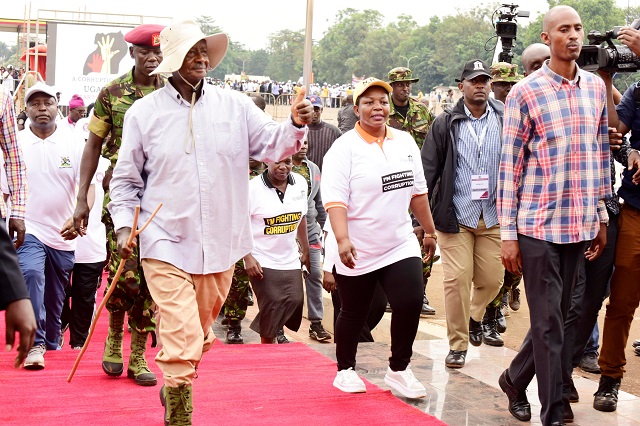
Fighting corruption
On the priorities of the next Head of State, Cissy Kagaba, the executive director of the Anti-Corruption Coalition Uganda (ACCU), says fighting corruption should be on top of the agenda during the post Museveni era.
“When Museveni was coming into power, he came up with a programme hoping to do things differently. He came up with a 10-point programme and no.7 was to fight corruption but he hasn’t been successful,” Kagaba says.
“I believe any new leader that comes up after him, will try to take action because of public outcry,” she says.
Museveni’s latest attempt at dealing with corruption was leading an anti-corruption walk in Kampala on Dec.4. The walk was heavily criticised as yet another passive attempt by Museveni at dealing with graft.
Edward Mwebaze, the acting country director for Oxfam told The Independent on Dec.10 that the anti-corruption walk and the talk about the anti-graft bill that is yet to be processed are actions that are merely aimed at showing the people that Museveni is serious about fighting corruption.
He said the opposition has used corruption scandals in their political work to undermine Museveni’s regime which is why many people are saying the President has to keep threatening those he thinks are corrupt.
Kagaba states that the other issue on the next leader’s to-do-list should be a reform of public administration which has spiraled out of control in Museveni’s reign.
“I think what the new leader should do is reduce on the number of very many districts created because cresting new districts means having more Members of Parliament, means increasing on money spent on salaries.”
She says the money to cater for the cost of public administration can be used to improve other services.
“There is a lot of impunity within the system and I believe if we bring in a new breed with a new momentum, things can change.”
President Museveni took over power and swore in on Jan.29, 1986, declaring a new dawn of “a fundamental change” in a country that had been ruined by war and tussle for power. A lot has happened in his 33-year reign with calculated moves to consolidate his power, co-opt opponents and a mix of different moves to win elections.
In his speeches, Museveni has displayed an obsession with the future often saying: “We are here to solve Africa’s problems.” He speaks with the conviction of a man with time on his side.
Speaking at the African Union meeting in Addis Ababa, Ethiopia, in February this year, Museveni, took a swipe at African chiefs whom he blamed for easy spread of colonialism. He advised his fellow leaders to focus on strategic security to defend Africa from foreign aggression.
However, Museveni’s thirst for power and deep entrenchment in various spheres of Uganda society has not stopped aspiring contenders to challenge his hold on power and by extension, planning for a possible near future when he is not in charge.
Sources who have claimed to be actively campaigning for Muhoozi Kainerugaba, the First Son, to take over the presidency have told The Independent in the past that there is an underground movement to pave way for Muhoozi, a Lieutenant General, so that in case of an eventuality, it is rolled out.
Spire Sentongo, a columnist at The Observer recently has been one of those writing about a post Museveni era in a series titled “Things to do after Museveni goes”. He wrote in one of his columns, “There are many Ugandans (who have) resigned to their dread and almost convinced against nature and history that Museveni is here to stay forever.”
“And this is understandable in our circumstances where many state institutions appear to be acting for his perpetuity; where dissent and freedom of association are increasingly criminalised, ”he added.
Power exits in Africa
Exits from power of long serving African leaders tends to lead to unpredictable events. In Kenya, as the reign of former Kenyan president, Daniel Arap Moi, came to an end in 2002 as a result of local and international pressure, he picked on Uhuru Kenyatta, the son of the country’s founding president, Jomo Kenyatta, to take over. Uhuru was defeated in the 2002 election but he contested in subsequent elections and won.
Although tapping Uhuru, now Kenya’s fourth president, as his successor was scorned by some as sowing seeds of a political dynasty, others argue that a named successor makes the process of managing transition a less murky one. Former Angolan president José Eduardo dos Santos named his right man and former defence minister, Joao Lorenco, as successor who won the election and took over in 2017. The two, however, have fallen out.
In other instances, the aftermath of regime changes has proved a difficult time which makes the time after Museveni a strange affair to envisage. When former Zimbabwean vice president Emmerson Mnangagwa took over from Robert Mugabe after a coup in 2017, Zimbabweans and analysts say he has become a worse dictator than the man he ousted.
Supporters and opponents of President Museveni also draw on events like happened in Sudan this year in discussions on Museveni’s exit from power. Omar-el-Bashir was ousted from power by his military after months of protests in the capital Khartoum made his position increasingly untenable. Like Museveni, the military was a key constituency for Bashir.
Museveni made remarks in that regard to warn opponents at an event in Naguru, Kampala, while commissioning a CCTV National Command and Control Centre.
“Security is my area, my constituency. That is my battle ground. If you want to challenge Uganda, you should look for another constituency. We are going to defeat these criminals. This is just the beginning,” he said.
Bashir was detained in April by his top Generals after protests became uncontrollable. Currently, Sudan has a Prime Minister Abdalla Hamdok who was chosen by the protest movement and he rules in concert with a sovereign council which has military and civilian members.
In other worst-case scenarios like in Gambia, former president Yahya Jahmmeh held his country at ransom as he refused to give up power when he was defeated in an election. It was after a combined force of West African troops intervened that Jammeh was forced out and he sought refuge in Equatorial Guinea.
 The Independent Uganda: You get the Truth we Pay the Price
The Independent Uganda: You get the Truth we Pay the Price




Very useful.
Let president museveni give chance to people like Hon Rugunda the current prime minister he is honest than all of those other guys like the Byesigye
Rugunda is too agreeable, diplomatic and lacking in assertiveness to be Uganda’s president….Rugunda lack of leadership abilities was further exposed when he failed to resolve the Acholi-Madi conflict over Apaa land…
Though most likely he is a good person and a good diplomat
Leaders come, leaders go.. The only next president to try/manage to rule Uganda should be a civilian because it seems like we Ugandans are fed up of Army leaders since they do not respect and value Civilians rights.
Kick the ass out of our country! Let him return to Rwanda but I am worried, only as an immigrant!
The real problem is the bush war generation in Uganda and in Rwanda. Museveni and Kagame are prisoner of the past and they applied their war mentality to govern their countries. This was good in the past when there was need to rebuild Uganda from decade of brutal dictators and Rwanda front the genocide. Now this war generation is an obstacle for real development and true democracy. Uganda and Rwand need a post war generation of young politicians not slave of the past. The problem is that both Museveni and Kagame in all these years they work hard to create just clones and faithful servant in their governments making sure that there will not be valid politicians inside the opposition.